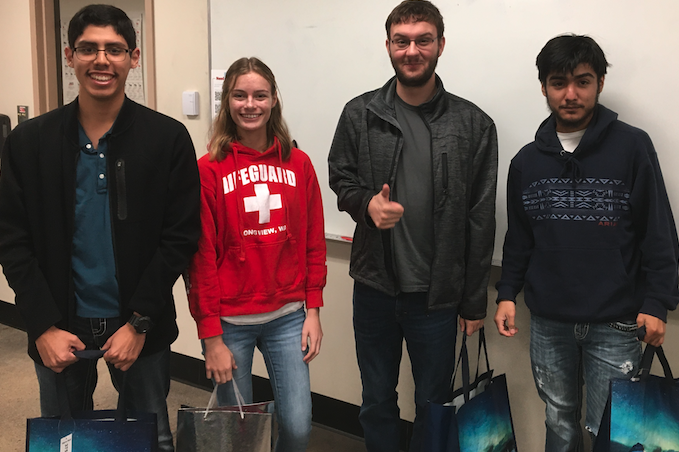
Pictured: Raul Leija, Jordan Chapin, Evan Sears, and Maiko Estrada
By: Dr. Andrew Yox, Honors Director
For ten years in the “BioTex” seminar at NTCC, honors students have experienced a November “email shootout.” This is something like a cross between an ongoing basketball game with scores changing in real time, and a fast-paced, scholarly-poetic thinkathon. The course challenges students to conceptualize the elements of their Texas history research essays, to utilize crossover “analogs, (terms)” particularly from biology, and to provide terse definitions of their newly minted concepts.
This year’s winners of the 10 November event included a team appropriately named the “Ganadores,” and an individual high scorer with the most promising “arresting concept.” Jordan Chapin, Raul Leija, and Evan Sears comprised the Ganadoressquad, and Maiko Estrada won the individual challenge.
All four students now have promising “governing concepts” for their 3300-word essays in Texas history, due at the end of Finals Week. Chapin is working on “Legendary Housewives,” in modern Northeast Texas. These were women who resisted the feminist currents in the culture to homeschool, or to provide a more prominent domestic support-system for their families. Leija’s theme is the “Disease of the Disease”—how accounts of the COVID virus in the culture of 2020-21 in Dallas included a more general feeling of anxiety than accounts of the Spanish Flu in 1918. Evan Sears, the 2021 Film Scholar of Honors Northeast has settled on Carroll Shelby as the “Emissary of the Muscle Car,” in explaining the significance of this Camp-County-born doer-developer of the Cobra. Finally, Maiko Estrada developed the term “Well-Being Activist” to describe the contributions of the once-famous Texas health icon, Red Duke.
Honors Director and Texas history professor Dr. Andrew Yox notes that “conceptualization is the key to writing an alluring, coherent essay, animated by a creative argument. Our students do this well, and there are many more we could mention not only in the honors seminar, but in non-honors sections of history where a state-mandated goal is to form a “creative argument.” At the same time, I am very excited about the highly conceptualized essays Chapin, Estrada, Leija, and Sears are developing.”
Each of the four students received a gift bag, courtesy of the generosity, and encouragement of scholarship expressed by donors of Honors Northeast.
